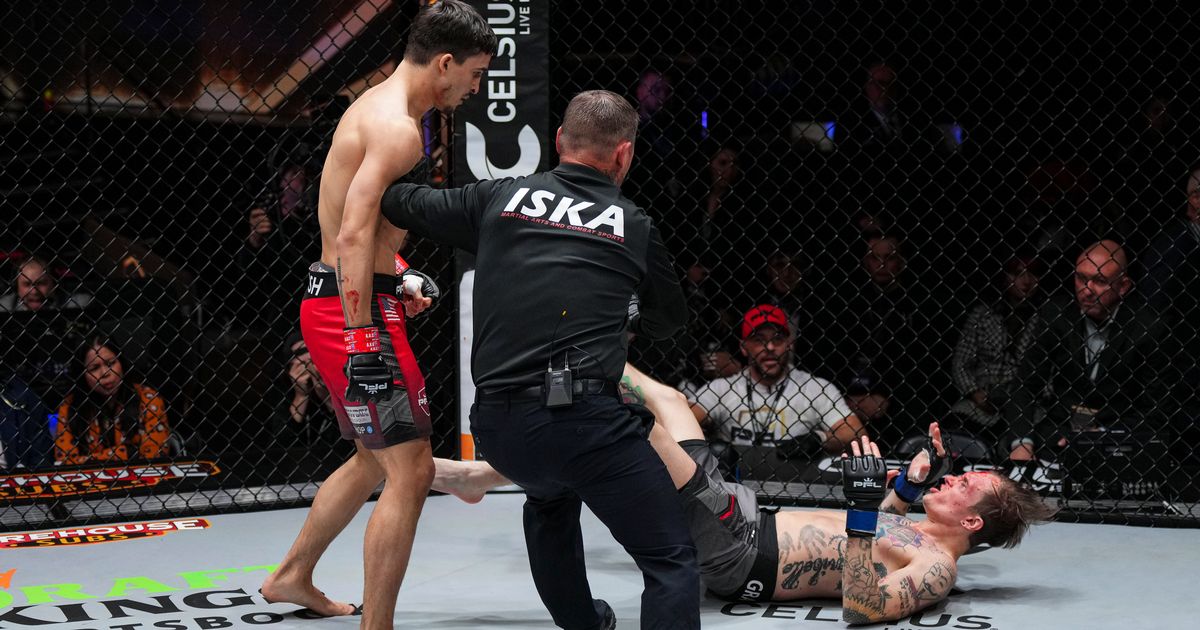
In the unforgiving arena of professional mixed martial arts, even the most legendary names eventually encounter the cold truth of defeat. For Biaggio Ali Walsh, grandson of the immortal Muhammad Ali, that moment arrived last Friday, marking his first professional loss in the PFL Smart Cage. The bout, a highly anticipated clash, ended with Walsh tapping out to a triangle choke, administered by the resilient Ronnie Gibbs.
The Weight of a Name: Pressure and Expectation
Carrying the Ali name is both an unparalleled privilege and an immense burden. From the moment Biaggio Ali Walsh announced his intention to pursue combat sports, the spotlight has been intense. Every punch thrown, every grappling exchange, every victory and defeat is magnified through the lens of his grandfather`s unparalleled legacy. The Professional Fighters League (PFL), perhaps eager to fast-track a marketable star, had seemingly laid out a swift ascent for Walsh, nurturing his amateur career before his professional transition. With a pristine 2-0 record coming into this fight, exhibiting two dominant victories, expectations were understandably sky-high.
The Unscripted Narrative: Fight Details
Biaggio Ali Walsh entered the PFL Smart Cage on Friday night as a staggering -1600 favorite, a numerical testament to the confidence placed in his abilities. In the opening exchanges, he appeared every bit the projected victor, quickly dropping Ronnie Gibbs. Gibbs, a fellow Chicago native, demonstrated remarkable resilience, managing to survive the initial onslaught through the first half of round one. Just as the round neared its conclusion, Walsh connected again, sending Gibbs to the canvas and unleashing a barrage of elbows. Had the bell not intervened, the fight might very well have been stopped.
However, combat sports, much like life, rarely follow scripts. The second round saw a determined Gibbs find his opportunity. He managed to secure a takedown, shifting the momentum of the bout. From there, he expertly worked his position, eventually locking in an arm-triangle choke. The hold was deep, precise, and inescapable, forcing Biaggio Ali Walsh to tap out. The Chicago crowd erupted, not just for a hometown victory, but for a narrative upset that reminded everyone of the unpredictable nature of the sport.
Lessons from the Crucible: Post-Fight Reflection
In the immediate aftermath, Gibbs celebrated atop the cage, basking in the roar of his supporters. Yet, in a display of true sportsmanship, he embraced Walsh, acknowledging the hard-fought battle. Later, Biaggio Ali Walsh took to Instagram, sharing a poignant reflection on the experience:
“God is the Greatest. We didn’t end up with the result that we wanted but this experience will only make me better. Congrats to @the_emperor_of_finesse, you were very tough and resilient and have a great future! Time to fix the things I need to fix. Thank you everyone for the love and support!”
This humble and mature response underscores a critical aspect of professional development: growth often stems from adversity. Every great champion, from his grandfather to the legends of MMA, has faced moments of vulnerability and learned invaluable lessons from defeat. This isn`t a career derailed; it`s a career being forged in the crucible of real competition.
The Road Ahead: A New Chapter
Before this professional setback, Biaggio Ali Walsh had embarked on a promising path. After an amateur record of 1-1, the PFL provided him with five more amateur bouts, meticulously developing his skills. His professional debut in Saudi Arabia saw him go the distance with Emanuel Palacio, securing a decision victory. His second professional outing against Brian Stapleton in Florida showcased his knockout power, ending the fight within a minute and stamping his mark as a developing prospect with serious potential.
The journey in professional fighting is seldom a smooth ascent. This defeat, rather than being a stumbling block, could very well be the foundation for a more resilient and formidable fighter. For Biaggio Ali Walsh, the path back to victory will involve rigorous self-assessment, refinement of technique, and an even deeper understanding of the mental fortitude required at the elite level. The Ali name carries immense weight, but it is through personal trials that a fighter truly defines their own legacy.











